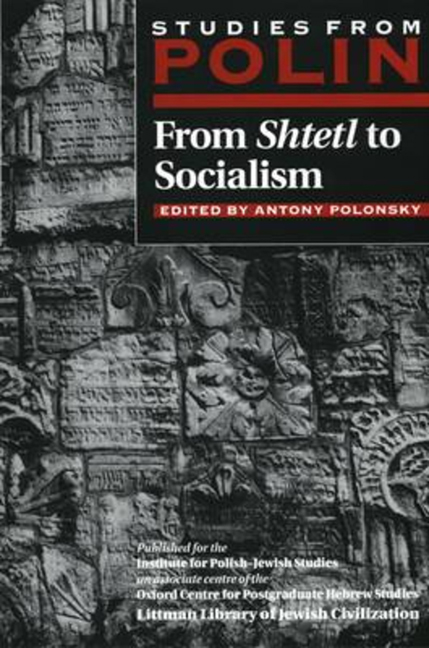Book contents
- Frontmatter
- Dedication
- Editors and Advisers
- Polin
- Polin: Studies in Polish Jewry
- Acknowledgements
- Contents
- List of Maps
- Introduction
- PART I PRE-PARTITION POLAND (to 1795)
- PART II THE NINETEENTH CENTURY
- 7 The Jews of Warsaw, Polish Society, and the Partitioning Powers, 1795-1861
- 8 The Jewish Community in the Political Life of Łódź in the Years 1865-1914
- 9 Aspects of the History of Warsaw as a Yiddish Literary Centre
- 10 Non-Jews and Gentile Society in East European Hebrew and Yiddish Literature 1856-1914
- 11 Trends in the Literary Perception of Jews in Modern Polish Fiction
- 12 Eros and Enlightenment: Love against Marriage in the East European Jewish Enlightenment
- 13 Gender Differentiation and Education of the Jewish Woman in Nineteenth-Century Eastern Europe
- 14 Polish Synagogues in the Nineteenth Century
- PART III BETWEEN THE TWO WORLD WARS
- PART IV THE SECOND WORLD WAR
- PART V AFTER 1945
- Notes on Contributors
- Chronological Table
- Maps
- Glossary
- Index
8 - The Jewish Community in the Political Life of Łódź in the Years 1865-1914
from PART II - THE NINETEENTH CENTURY
- Frontmatter
- Dedication
- Editors and Advisers
- Polin
- Polin: Studies in Polish Jewry
- Acknowledgements
- Contents
- List of Maps
- Introduction
- PART I PRE-PARTITION POLAND (to 1795)
- PART II THE NINETEENTH CENTURY
- 7 The Jews of Warsaw, Polish Society, and the Partitioning Powers, 1795-1861
- 8 The Jewish Community in the Political Life of Łódź in the Years 1865-1914
- 9 Aspects of the History of Warsaw as a Yiddish Literary Centre
- 10 Non-Jews and Gentile Society in East European Hebrew and Yiddish Literature 1856-1914
- 11 Trends in the Literary Perception of Jews in Modern Polish Fiction
- 12 Eros and Enlightenment: Love against Marriage in the East European Jewish Enlightenment
- 13 Gender Differentiation and Education of the Jewish Woman in Nineteenth-Century Eastern Europe
- 14 Polish Synagogues in the Nineteenth Century
- PART III BETWEEN THE TWO WORLD WARS
- PART IV THE SECOND WORLD WAR
- PART V AFTER 1945
- Notes on Contributors
- Chronological Table
- Maps
- Glossary
- Index
Summary
Social and political life in Łódź after the January Uprising of 1863 was influenced by numerous factors. These include the dynamic economic development of the city, the rapid growth of its population and its multinational structure. The socio-national conglomeration stimulated the growth of nationalist feelings, but also, on the other hand, provided a favourable background, especially in workers’ circles, for the spread of internationalist ideas. The city's political life certainly developed in unfavourable legal and constitutional conditions. Among them were the reactionary political system of the Russian state, the lack of democratic institutions and national freedom in the Kingdom of Poland, the ban on meetings, political parties and trade unions (until 1906), and the extensive police control. Łódź had no self-government, but a bureaucratic municipal council nominated by the Russian authorities. In addition, other public institutions which were necessary to create bonds of community and improve the quality of life of the many immigrants of different nationalities and social status who were attracted by this Polish ‘Promised Land' and who were lacking in the elements of civilization were either created too late, or had a very little influence. The ban on legal, political and social activity forced people to conspiracy. Many Polish and Jewish workers came to the conclusion that only violent forms of struggle were effective and often adopted terrorist methods.
Political life in Łódź in the period between the January Uprising and the First World War was marked by a characteristic irregularity. Long periods of quiescence were followed by violent outbreaks - short periods of unnatural acceleration such as, for example, the Łódź Uprising of May 1892, or the 1905-1907 Revolution. This pattern was, of course, closely related to the general situation the Polish Kingdom, where the rhythm of political life was similar. Yet nowhere else on Polish territory did this acceleration demonstrate such an extraordinary pace, or reveal itself with such force.
The position of Jews was determined not only by these factors but also by additional elements, among them the legal conditions under which they lived. Aleksander Wielopolski's reforms of 1862 abolished almost all discriminatory regulations which affected the Jewish population in the Polish Kingdom.
- Type
- Chapter
- Information
- From Shtetl to SocialismStudies from Polin, pp. 103 - 119Publisher: Liverpool University PressPrint publication year: 1993



